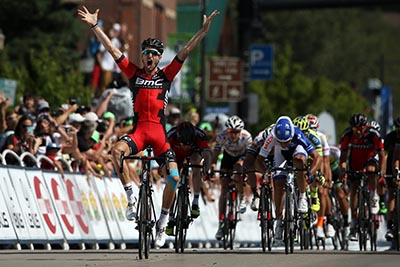
Race Radio: Phinney's Break From Cycling, UHC vs. Rohan Dennis and The Big Apple In Colorado
Taylor Phinney's Stage 1 win bookends a 15-month hiaitus from cycling. Team United Healthcare battled Rohan Dennis in the final run-in to Steamboat Springs. Matthew Busche has a trick to suffering up climbs.
 Taylor Phinney's victory in Steamboat Springs bookmarked a challenging 15-month period for the Boulder native. In May 2014, Phinney crashed while avoiding a motorcycle during the USA Cycling National Championships road race and slammed into a guardrail. The impact snapped Phinney’s left tibia and fibula, and left Phinney’s cycling future in limbo.
Taylor Phinney's victory in Steamboat Springs bookmarked a challenging 15-month period for the Boulder native. In May 2014, Phinney crashed while avoiding a motorcycle during the USA Cycling National Championships road race and slammed into a guardrail. The impact snapped Phinney’s left tibia and fibula, and left Phinney’s cycling future in limbo.
Speaking at the post-race press conference, Phinney fought back his emotions as he discussed the various challenges he overcame during his 15-month hiatus from cycling.
“The first eight weeks when I was on crutches was the most difficult part — when you lose general mobility it makes it hard to hang out with your friends,” Phinney said. “You’re just crutching along and holding everybody up.”
Phinney admitted that another challenging period came during the 2014 USA Pro Cycling Challenge. Not participating in the race, he said, was agonizing. He attended several stages of the race to work as a commentator and to visit his teammates. But the stress of not racing, he said, persuaded him to take a break from the cycling community while he pursued his physical therapy.
“Being around the race atmosphere and just limping around — ugh, this didn’t make me feel good,” Phinney said. “It was a bit too much. That’s when I decided to take a break from the sport.”
Cycling is a life-encompassing sport, and cyclists often forego hobbies and other activities in pursuit of their sport. While he rehabbed his leg, Phinney took flying lessons. He also took up painting. After more than a year of rehab, he was finally physically ready to race. Phinney said the time away from the sport was needed.
“I realized I needed to eject myself from the sport and from thinking about the sport as much as I possibly could,” Phinney said. “I removed myself and tried to find other things that inspired me in the ways that riding a bike inspired me.”
Team UnitedHealthcare battles Rohan Dennis
The USA Pro Cycling Challenge served up a healthy share of drama in waning miles of Stage 1, as BMC’s Rohan Dennis attacked alongside Optum’s Guillaume Boivin and pulled out a 20-second gap on the group. Team United Healthcare rode on front of the peloton trying to pull the duo back. As the kilometers wound down, the gap appeared to hold steady. Could UHC pull it back? Would Dennis stay away?
UHC’s Chris Jones said that while the dramatic situation made for great spectating, it was horribly painful for his teammates. The team formed a pace line, which is where each rider rotates riding as hard as he can at the front, before tucking back into the draft. They eventually brought Dennis back, but it hurt.
“We call it a ‘Through and off,’ because you pull through, you’re on the front, and then you’re off,” Jones said. “When Rohan Dennis is off the front, it takes everyone to chase him back.”
 The Big Apple comes to Colorado
The Big Apple comes to Colorado
There’s a sole American racing on Spain's Caja Rural-Seguros team. Kyle Murphy, 24, turned heads earlier this year after finishing 8th at the USA Cycling National Championships for the Lupus pro cycling team. He was invited to race with Caja Rural after completing China’s Tour of Quinghai lake last month.
Murphy hails from Portland, Oregon, but got his start racing bicycles in Central Park and Brooklyn. A member of New York City’s Century Road Club of America, Murphy also competed raced a fixed-gear bike at the Red Hook Criterium.
Murphy praised the aggressive New York racing scene for helping his progression to the pro ranks.
“You can race four times a week, and everybody is really cutthroat in the races,” Murphy said. “You learn quickly how to race tactically, and I could appreciate that.”
Busche's Key to Suffering
Matthew Busche came to the USA Pro Cycling Challenge as tentative co-leader leader of the Trek Factory Racing team. Busche is recovering from a painful crash at the Tour of Utah, which forced his abandonment from that race.
On the final two climbs during Stage 1, Busche began to feel the stress of the injury and the time off of the bike. He held on to finish in the group, but said he suffered greatly.
Busche said that a simple mental trick often helps him overcome pain on the bike.
“You tell yourself that [the pain] is temporary, and it ends at the finish line,” Busche said. “After that, your body is just going to stop when it can’t go anymore.”












